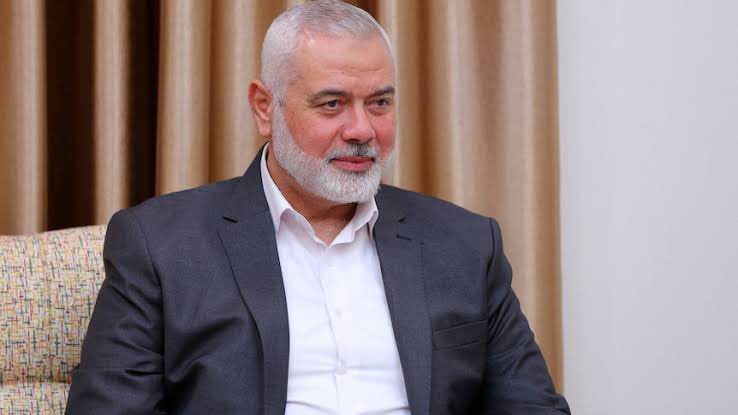Iran’s Revolutionary Guards Corps (IRGC) has confirmed the death of Ismail Haniyeh, the prominent political leader of Hamas, during a ceremony inaugurating Iran’s new president, Masoud Pezeshkian. Haniyeh, who had been residing in Qatar, was reportedly killed alongside an Iranian security guard at their accommodation in Tehran.
Haniyeh was a key figure in Hamas, known for his role in the group’s political leadership. His death, alongside that of his bodyguard, was confirmed by both Palestinian authorities and Iranian officials.
Hamas was quick to attribute the assassination to Israel, although Israeli officials have not commented on the incident. In a statement, Hamas referred to the attack as a “treacherous act of the Zionists on his residence” in Tehran, occurring on Tuesday morning. The IRGC announced that an investigation into the incident is ongoing.
The assassination of Haniyeh is a “cowardly act that will not go unpunished,” said senior Hamas official Moussa Abu Marzouk, as quoted by the Hamas-run Al-Aqsa TV channel.
Sami Abu Zuhri, another senior Hamas official, described the killing as a “grave escalation” intended to undermine Hamas’ resolve. He asserted that Hamas remains determined to continue its activities, expressing confidence in their eventual victory.
The incident comes amid heightened tensions between Israel and Hamas, following an attack by the group on October 7, which resulted in 1,200 deaths and the abduction of approximately 250 individuals. Israel had publicly threatened to target Hamas leaders, including Haniyeh, in retaliation.
Earlier this year, an Israeli airstrike in Gaza killed several members of Haniyeh’s family, whom Israel accused of being involved in terrorist activities. Haniyeh had been based in Qatar, where he served as a diplomatic representative for Hamas, participating in ceasefire negotiations and discussions concerning the return of Israeli hostages during the ongoing conflict.
The killing of Haniyeh coincided with other regional incidents, including an Israeli airstrike in Beirut targeting senior Hezbollah commander Fuad Shukr. This strike resulted in the deaths of three civilians, including two children, and left 74 others injured, according to Lebanon’s health ministry.
Lebanon’s government condemned the Israeli airstrike as a “blatant act of aggression” and announced plans to lodge a complaint with the United Nations Security Council. The situation in the region has prompted reports of U.S. military movements, although these forces were already present in the eastern Mediterranean.
Following the news of Haniyeh’s death, oil prices saw a noticeable increase, reflecting the market’s sensitivity to geopolitical instability in the Middle East. The assassination has sparked widespread condemnation from various factions within the region, with promises of swift retaliation from Hamas.
The Lebanese National News Agency (NNA) reported significant damage and casualties in Beirut, particularly in the Haret Hreik area, where a civilian woman was killed and 68 others were injured, some critically. The incident highlights the broader humanitarian impact of the escalating conflict.
🔴 IRGC: Head of Hamas political bureau Ismail Haniyeh martyred in Tehran.#Hamas #Iran pic.twitter.com/HDQwlh3Xzv
— Press TV 🔻 (@PressTV) July 31, 2024
Israel’s Prime Minister Benjamin Netanyahu had vowed a stern response to the Golan Heights strike, which Hezbollah denied responsibility for. Lebanon’s current prime minister condemned the airstrike and plans to file a complaint with the U.N. Security Council.In Tehran, during the inauguration of President Masoud Pezeshkian, senior figures from groups within Iran’s “axis of resistance,” including Haniyeh, were present.
Hamas leader Ismail Haniyeh is killed with one of his bodyguards in Tehran. pic.twitter.com/widFinIbnF
— ZaidBenjamin زيد بنيامين (@ZaidBenjamin5) July 31, 2024
Shortly after his speech asserting support for Palestinians, news of Haniyeh’s assassination broke. Immediately after the news of Haniyeh’s death broke, multiple reports emerged that Hamas vengeance would be swift. Member of the Hamas Political Bureau, Musa Abu Marzouk said that the assassination of Haniyeh is a cowardly act and will not be in vain.
The price of oil rose after the report hitting a session high.
The Lebanese government has condemned the “blatant act of aggression” following the Israeli airstrikes on southern Beirut. While some reports have claimed US warships are moving closer to Lebanon in the wake of the crisis, the reality is that American warships and military assets were already in the eastern Mediterranean region.
Lebanon’s National News Agency (NNA) has reported that a female civilian was killed after a building was destroyed in Haret Hreik, in Beirut’s sout. “Sixty-eight civilians were injured, five of whom were critically injured, while the rest suffered moderate to minor injuries. Most of them were treated in emergency departments and were discharged from hospitals,” NNA said.
More footage has emerged showing the extent of damage.
Israel just bombed a residential area near a hospital in Beirut, Lebanon and violated Security Council resolution SCR 1701 with absolutely no consequences. This is a war crime.
Lebanon has the right to defend itself under international law. pic.twitter.com/JQPJDCXuX9
— Mohamad Safa (@mhdksafa) July 30, 2024
As investigations continue, the international community watches closely, concerned about the potential for further escalation and its implications for regional stability. The situation remains fluid, with the possibility of further developments impacting both diplomatic relations and security dynamics in the region.

















